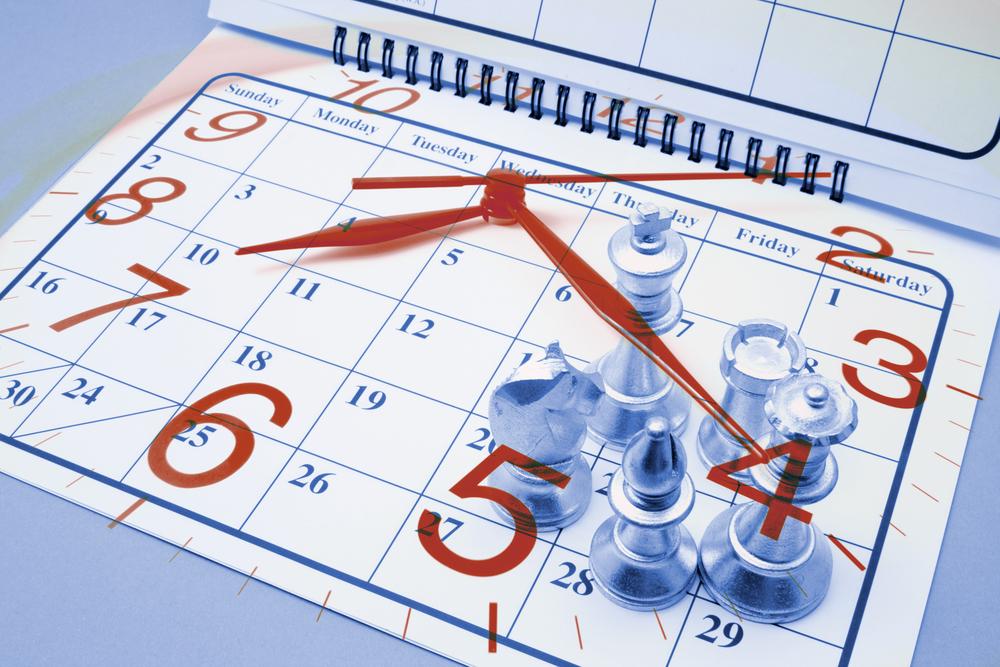
Chess: The Waiting Game?
The day my daughter was due was approaching. There was not much to do but wait. Another day passed. I couldn’t concentrate on work. Another day, and then another. I couldn’t write; my words were blocked. I couldn’t sleep. Another and another. When I tried to read, my attention wandered. Another, another, another.
I couldn’t play chess—or shouldn’t have played chess, but I did.
I played chess very badly. It had been my habit for some time to play a 30-minute rapid game every night. I had rarely missed a day. I usually tried to play at a time when I could focus, when I could clear an hour and think of nothing but Catalans, but I played even if it meant blitzing out moves while filing a story on deadline, or playing on my phone while sitting on an airplane waiting to take off, or, once, at Wimbledon inside Centre Court.

Roger Federer at Wimbledon. | Photo: Louisa Thomas.
The idea behind the rapid games was simple: my chess was bound to improve with the daily discipline. The drills and tactics that I did were instructive, but they were no substitute for the real thing. I needed to build experience with the pressure of the clock. I needed to figure out what opening repertoire best suited my style, and the best way to do that seemed to be to try different ones over a sustained period. For that matter, I needed to figure out my style.
I tried playing e4, then switched to d4. I played the Najdorf. I dared the Grünfeld. I tried the Scotch and the Catalan, and dared my opponents to give me Benonis. Every day, after my game was over, I would spend a little time analyzing the game. I’d refer to chess books to look through different recommended and discouraged lines. Occasionally, I’d do this on a real board. And when I was done with my own analysis, I would run the computer engine, and see what I’d done well and where I’d gone wrong.
It had been working, more or less. My game was improving, if not steadily, then in fits and starts. My online rating would jump, fall back, and plateau—but I was confident that if I kept working, it would jump again. And so it did. I became comfortable with a couple of different openings, figuring out where lines became sharp and where they became boring. I started to see certain patterns and to coordinate pieces. I lost a lot of games on time, but I began to get better at dealing with the clock, especially early on in games, when I could rely on opening theory instead of having to take the time to calculate from scratch (at least when I could remember opening theory, which was, admittedly, rare).
I identified some of my biggest weaknesses (my bad memory, my penchant for wasting time panicking, my habit of not calculating a line through to the end...I could go on), and I worked on coming up with ways to minimize them, if not totally overcome them.

As the baby’s due date approached, though, I found myself performing worse and worse. I started tilting. I lost night after night. I lost in the ways I’d always lost and invented new ways to lose. Sometimes I lost out of the opening. Sometimes, I’d sneak my way into a position up a pawn, or apply pressure on a dangerous file. Occasionally I’d even be up a full piece. But my habit of making the lazy move, squandering my good position, and hanging a bishop, got worse and worse.
A few of the games were horror-fests, spectacular displays of ineptitude all around. There was, for example, one instance when my opponent missed mate—twice—only to give me a knight (and, but for a mistake of my own, nearly two knights). Before I could capitalize on my crushing advantage, though, I gave the knight back, blundered away my lead, and having already effectively lost, made a series of panicked moves. I finally resigned when my opponent forked my king and queen.
No lead, no matter how big, seemed safe.
I was skittish. My confidence tanked. My morale was worse. My chess really wasn’t improving. In fact, I was reinforcing bad habits. Worse, I wasn’t enjoying it anymore. The days ticked by, and my brain was busy elsewhere. Finally, I accepted a hard truth: sometimes, it’s better to take a break. Chess has been around for centuries. It would be there when I was ready to return to it.
That didn’t stop me from doing chess tactics when I finally went into labor. The pain came in waves. I tried to train my attention on the tiny wandering king on my screen. As the timer ticked by, waiting for me to move my knight, I counted the minutes between contractions. Every minute seemed to contain hours; the hours were lifetimes. It was 11 p.m., then 12. I should have been trying to sleep; I knew, of course, that it would be many months or years before I slept through the night again. Instead, I sacked rooks and queens.
I lost most of the tactics, just like I’d been losing most of my games. Maybe almost all of them. I can’t remember how much my rating dropped that night, but it was a lot. A few weeks later, I’d wipe out my tactics history altogether, determined to start from scratch. But on that particular night, when I was in labor, I couldn’t think of anything more than one or two moves ahead. I was just counting the seconds, moving the pieces, recklessly sacking —doing whatever I could to keep my mind off what was happening, for as long as I could.
What was happening was impossible to ignore for too long. The next morning, I held my mewling little baby. And for a brief moment, my mind turned, once more, to chess.
She is my king, I thought as I held her, washed and bundled. She is the most important thing. I will do whatever is in my power, I will sacrifice everything, to support and defend her.
And then, I thought to myself, she will be like a pawn, venturing forth, one step at a time. Then she will become a knight, leaping and cartwheeling, tumbling this way and that. Then a bishop, venturing further, daring new and distant things. One day, she’d be like a rook: strong, solid, powerful, moving straight and true, knowing what was right, and what was better left.
And finally, a queen.

She lay on my stomach, her tiny head against me, both our hearts beating fast. Yes, I thought to myself. She will have that strength, that range, that power. One day, she will be a queen.

Louisa Thomas is an American writer, author of two books (including Louisa: The Extraordinary Life of Mrs. Adams), a regular contributor to NewYorker.com, former writer and editor at Grantland.com, and "obsessed" with tennis and chess. You can follow her on Twitter.

